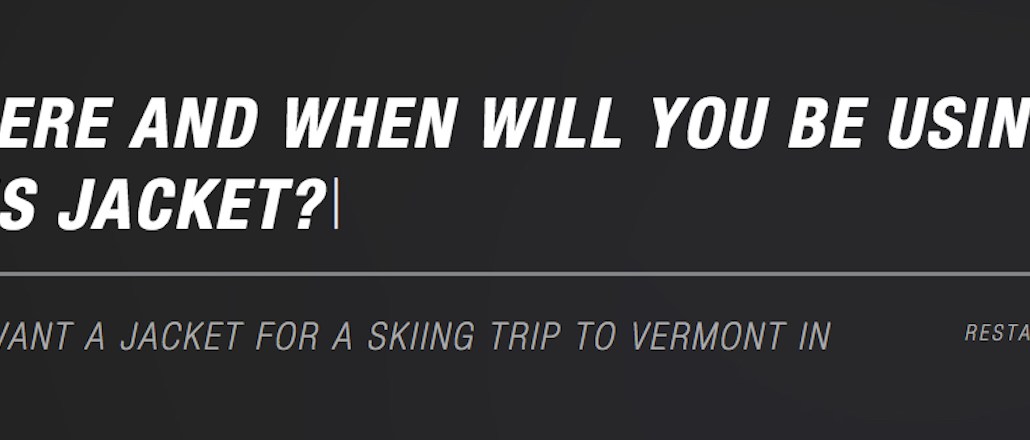Save 50% on a 3-month Digiday+ membership. Ends Dec 5.
The North Face launched an online customer service tool powered by conversation

The North Face wants to help customers find the perfect coat for their climate, even when they’re shopping from their couches.
Its new online shopping platform called the “Expert Personal Shopper” mimics the experience of speaking with an in-store salesperson — one with massive data at their fingertips. The platform asks shoppers a series of questions, determined by Watson, to figure out what they’re looking for, then suggests products based on the answers the shopper types in response to the queries.
“When you think about the online shopping landscape, it’s a white background with a grid of products,” said Cal Bouchard, senior director of e-commerce at The North Face. “We wanted to change that to be a question-answer conversation. They tell us what they want and we tell them what we have — it’s about context.”
The North Face tapped IBM’s Watson to help decide what to ask. The typed questions begin with “Where and when will you be using this jacket?” and go on to ask if it’s for men or women, what activity it will be used for, what precipitation is anticipated and color and weight preferences, getting more specific as the user replies in the text box.
The technology replaces the need to rely on pre-sorted categories and product reviews when shopping online, as well as the clunky (and awkward) customer service chat tools used by some retailers. During the month-long testing period (the platform is in beta today), customer engagement with the tool lasted about two minutes, and The North Face saw a 60 percent click-through rate to the suggested products’ pages (conversion rates for actual purchases weren’t made available during the beta mode). The suggestions are supposed to improve as more people use the tool.

Fluid, the digital agency that built the platform, began working with IBM on the product two years ago.
Ad position: web_incontent_pos1
“We asked ourselves, what is online shopping missing today?” said Fluid CEO Kent Deverell. “E-commerce does price, selection and convenience well, but it doesn’t do the concept of advice. In store, you can talk to a sales rep and get smart product recommendations. Online, that’s a manual, labor-intensive process.”
IBM has used Watson’s ability to decipher online conversations for retailers before. Before Black Friday, IBM launched an app that tracked top-trending products based on conversations that billions of people were having across social media.
“What we’re doing is looking through mountains of unstructured data,” said Lauri Saft, vp of IBM’s Watson ecosystem. “That’s conversations on Twitter, Facebook posts, blog posts, articles and consumer reviews — massive amounts of text that were previously just floating around, untouched.”
Combining this unstructured data with Watson’s ability to process natural language, the tool can offer product recommendations based on geography and climate — things you need to consider when shopping for outerwear — as well as gender-specific usage and activity needs. That’s on top of the structured data such as category, style and color. Saft said that Watson’s commerce data could also be used to help sales associates improve their recommendations.
Deverell said that he sees this type of question-and-answer becoming the norm for people who need help figuring out what they’re looking for online. Depending on the store and product category, the questions would change. For instance, while suit-shopping, Watson would ask what the occasion is, what season it is, and what material and color you like. For stereos, it would ask what home set up you have, how much you’re looking to spend, and how frequently you plan to use it.
Ad position: web_incontent_pos2
The North Face plans to expand its platform to more categories as well as more content on the suggested product results — such as how to use certain tools, skiing tips. Bouchard added that the tool works for its whole catalogue and isn’t just to promote certain products.
“Right now, we’re focused on increasing engagement. Of course, we want to drive conversion, but we want it to be because we’re offering the customer a better way to shop,” she said.
Image via The North Face
More in Marketing

Ulta, Best Buy and Adidas dominate AI holiday shopping mentions
The brands that are seeing the biggest boost from this shift in consumer behavior are some of the biggest retailers.

U.K. retailer Boots leads brand efforts to invest in ad creative’s data layer
For media dollars to make an impact, brands need ad creative that actually hits. More CMOs are investing in pre- and post-flight measurement.
Ad position: web_bfu